





5-Year Aged Chenpi from Xinhui
- Regular price
-
£9.00 - Regular price
-
- Sale price
-
£9.00
Chén Pí | 5-Year Aged Tangerine Peel Chenpi from Xinhui (Chakeng, Cha Zhi Mandarin) 新會茶坑圈枝百年老樹五年紅皮陳皮
Sourced directly from Chakeng, the most esteemed terroir of Xinhui, this Chenpi is crafted from century-old Cha Zhi mandarins and aged for over five years. With its deep aroma, smooth flavour, and time-honoured craftsmanship, it embodies the finest expression of authentic Xinhui Chenpi. In Traditional Chinese Medicine, it is valued for regulating qi, aiding digestion, and promoting overall bodily balance.
“When asked to describe their work to our tea friends around the world, our Chenpi maker smiled and said: ‘We consider our Chenpi the Hermès of the Chenpi world.’
It’s a bold comparison, but one rooted in truth. Our own search for the finest Chenpi in China has shown us how easily the path can feel like a maze — all the more so for tea friends abroad, where young peel is sold as aged, false claims of origin are made, low-quality peel is disguised at high prices, or products are treated with harsh chemicals. Our sourcing is about cutting through this confusion and demystifying an ancient medicine by going straight to the source, without middlemen. This way, you can be assured of authenticity and food safety while enjoying Chenpi’s authentic flavours, aromas, and health benefits, and knowing that the land, people, and craft are sustained for generations to come.
The Finest Terroir
Our Chenpi originates from Chakeng (茶坑), where the finest Xinhui Chenpi is cultivated, recognised as the most esteemed terroir for growing the Cha Zhi mandarin (茶枝柑 / Cha Zhi Gan). This rare variety is treasured for its thick skin, rich oils, and deep medicinal value.
We are honoured to present this special batch, where only trees over a hundred years old are used, and only the red peel harvested in November is selected:
- Older trees have deeper roots and greater resilience, which give their fruit a thicker skin, more abundant oils, and larger, brighter pores — signs of potency and medicinal strength. Peels from younger trees lack this density, and their flavour is thinner, less enduring.
- The November harvest is equally essential. At this stage, the fruit has fully ripened and the peel develops its richest fragrance and sweetness, while still retaining balance and structure. If picked earlier, the peel is too bitter and sharp; if picked later, it risks being overly sugary and harder to preserve.
Time-Honoured Craftsmanship
Our Chenpi is made in harmony with nature by our friends in Xinhui, a third-generation Chenpi-making family who have dedicated themselves to carrying forward this centuries-old craft:
- Harvesting is done at three distinct times, selecting only fruit at its proper stage.
- The peel is carefully cut into two or three segments, never into wide strips, so the body of the peel remains strong and resilient.
- The peels are turned and dried at intervals, ensuring even exposure.
- Only after three full years of natural ageing does it earn the name Chenpi, ensuring its hallmark qualities of sweetness, fragrance, and smooth depth.
The Right Timing
Chenpi’s flavour, aroma, and storage potential depend greatly on when the peel is picked:
- Green Peel (青皮, Aug–Oct): Bitter, with intense fruit notes, mainly used in medicine.
- Second Red Peel (二红皮, Oct–Nov): Fragrant, lightly aged, and pleasantly sweet — the most popular in the market.
- Big Red Peel (大红皮, Nov–Dec): Intensely aromatic and sweet, favoured by collectors, though its higher sugar content makes it harder to preserve.
Our Chenpi is harvested with a red peel in November, offering the best balance for both immediate use and long-term value.
Medicine in Daily Life
In Traditional Chinese Medicine (TCM), Chenpi is understood as warm and regulating. It helps move qi (vital energy), supports digestion, transforms dampness (such as bloatedness), and alleviates phlegm. For centuries, it has been considered one of the most efficient medicinal herbs to help:
- Regulate qi and support digestion.
- Reduce phlegm and ease coughing.
-
Improve circulation and balance the stomach.
Chenpi makes a gentle daily companion, whether enjoyed as tea or in cooking, and a trusted remedy for restoring or maintaining balance.
Chenpi in Tea Traditions
For generations, Chenpi has been one of tea's most valued companions, both for its taste and its health benefits. The peel smooths away bitterness, releases a light citrus fragrance, and warms the stomach, gently balancing tea’s cooling nature so its nourishment can be more fully absorbed.
These qualities offer benefits, particularly for individuals who experience heaviness, bloating, indigestion, stomach pain, or cough. For example:
-
With puerh or black tea, it deepens the body-warming quality and aids digestion after rich meals.
-
With oolong, it enhances fragrance and harmonises the body, making the tea gentler and smoother.
-
With green tea or aged white tea, especially in summer, it offsets the cooling properties, creating a more balanced cup.
- Combined with ginger, honey, and cinnamon, Chenpi makes a caffeine-free herbal brew that is both flavourful and deeply supportive for those who often feel cold, experience stomach discomfort, or struggle with digestion.”
The Gift of Ageing
As Chenpi ages, its qualities transform, especially those of outstanding quality will transform into what TCM sees as a valuable medicine for nourishing vitality. The peel darkens, the pores become fuller and brighter, and under the light the oil cells shine like a “sky full of stars.” The fresh citrus fragrance deepens into a mellow, resinous aroma with a subtle medicinal note.
- Younger peels are soft, pliable, and slightly astringent.
- Older peels become lighter, more brittle, and brew smooth, long-lasting infusions with a sweet aftertaste.
The longer it rests, the more valuable and gentle it becomes — a true gift of time.
Assurance of Authenticity
We can identify the quality of Chenpi by its look, smell, and feel:
- Appearance: Authentic, supreme-quality Chenpi is thick, with natural pig-hair-like veins and three lobes joined at the base.
- Aroma: Young peel smells citrusy; older peel carries a deep, layered fragrance with medicinal warmth.
- Texture: High-quality peel is supple and oil-rich, never flat or papery.
- Infusion: Good Chenpi brews a clear liquor — pale yellow when young, deep amber when old — with a smooth, lingering taste.
These qualities distinguish genuine, terroir-specific Chenpi from imitations that can be thin, sour, or perfumed.
An Heirloom of Time
Beyond its taste and health benefits, Chenpi is also treasured as a symbol of cultural wealth. Because it improves with age, authentic Xinhui Chenpi is widely collected and traded, much like fine wine or aged tea.
Its rarity, especially from Chakeng’s century-old trees, makes it both a daily nourishment and a long-term treasure — something to be enjoyed now, and something to keep as it continues to transform.
Couldn't load pickup availability
Health Benefits
- Regulates qi
- Aids digestion
- Transforms dampness
- Eases cough and phlegm
- Supports immune system
Cultural Significance
A Living Heritage
There is an old saying: “When the orange grows south of the Huai River, it becomes an orange; when it grows north of the river, it becomes a trifoliate.” 「橘生淮南則為橘,生於淮北則為枳。」It highlights how land and climate influence what grows.
Chenpi is produced in Guangdong, Guangxi, Fujian, Sichuan, Hunan and beyond, but Xinhui Chenpi has always stood apart. It is officially recognised as a National Geographical Indication Product of China, and sits at the top of the Chenpi hierarchy:
Xinhui Chenpi (Guangdong): The finest, from local Cha Zhi mandarins.
Sihui Chenpi (Guangdong): From hybrids of Cha Zhi and Xinggan.
Other provinces (Guangxi, Sichuan, Hunan, Hubei): Generic dried citrus peels such as Xiangke tangerine and Wenzhou migan.
Xinhui’s unique soil and water give its Chenpi a richness, depth, and medicinal quality unmatched by others.
Taste Profile
- Soft citrus
- Mellow & resinous
- Subtly sweet
Feel
- Warm
- Comforting
- Restorative
season
- November 2019
Elevation
Chakeng is part of the gently rolling plains of Xinhui (averaging around 56 m above sea level), which offers ideal drainage and subtle climatic variation perfect for Chenpi — neither too low nor too steep.
Tree Type
Cha Zhi Gan trees (茶枝柑)
Tree age
Over 100 years
Storing tips
Keep it dry and ventilated – Store Chenpi in a breathable, odour-free container such as a clay jar, paper bag, or unglazed ceramic vessel. Avoid trapped moisture.
Avoid damp and odour – Moisture and strong smells are easily absorbed by the peel, affecting its quality. Please keep it away from kitchens, perfumes, or humid spaces.
Stable environment – A cool, shaded place with good airflow is ideal. Avoid direct sunlight or high heat, which can damage its oils.
Air when needed, after the rainy season or damp season, it’s best to ‘air’ your Chenpi. Open the jar on a dry day to release excess moisture, ensuring the peel continues ageing evenly.
Long-term care – Properly stored, Chenpi only improves with time, deepening in aroma, flavour, and value year after year.
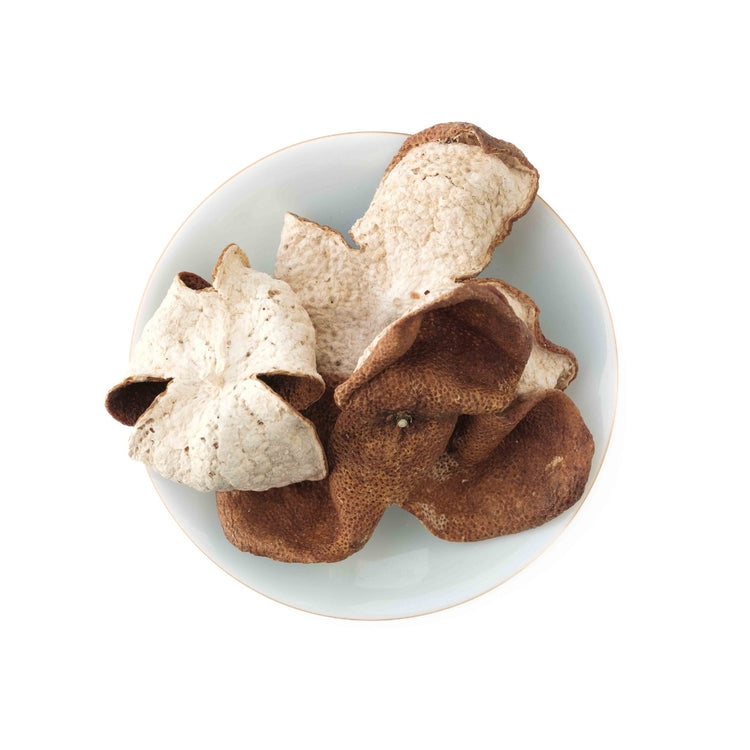
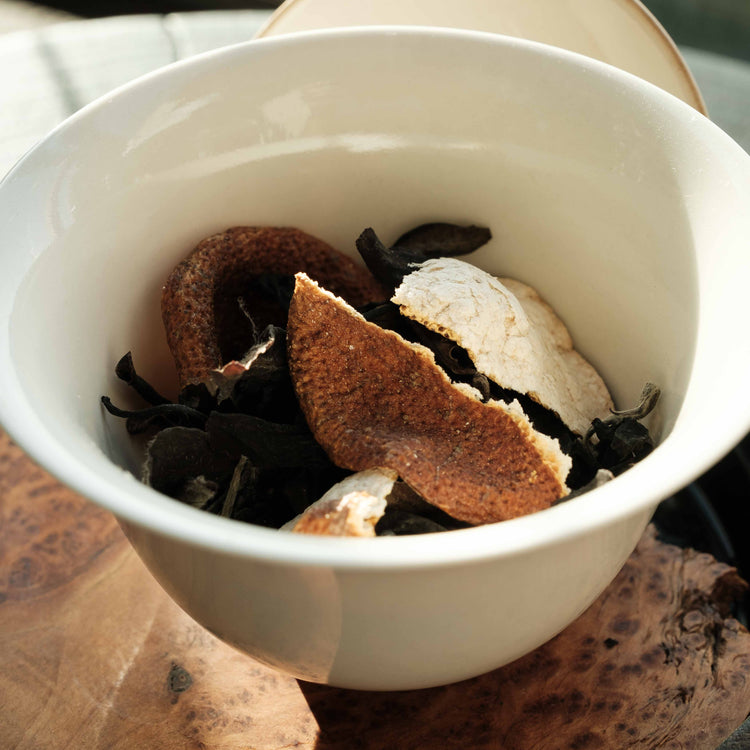
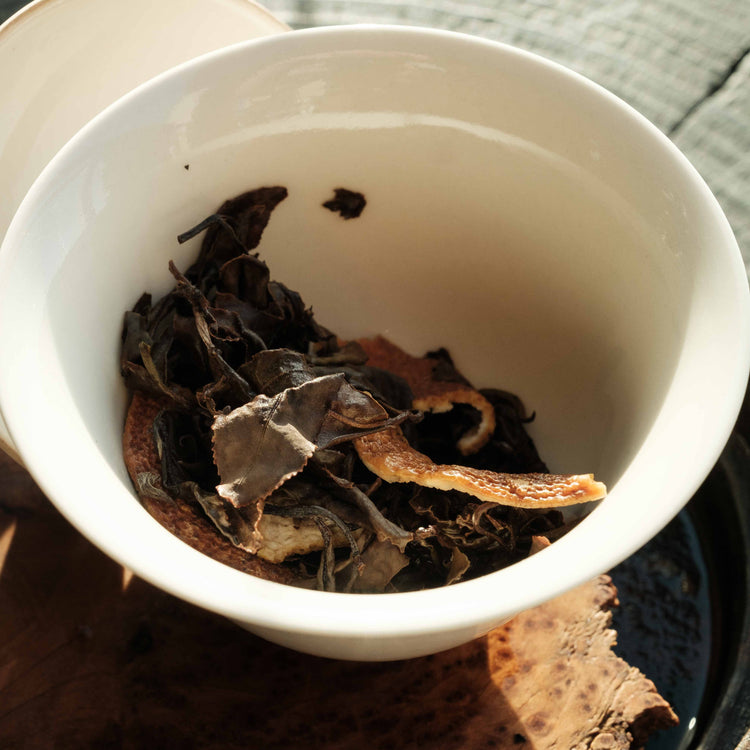
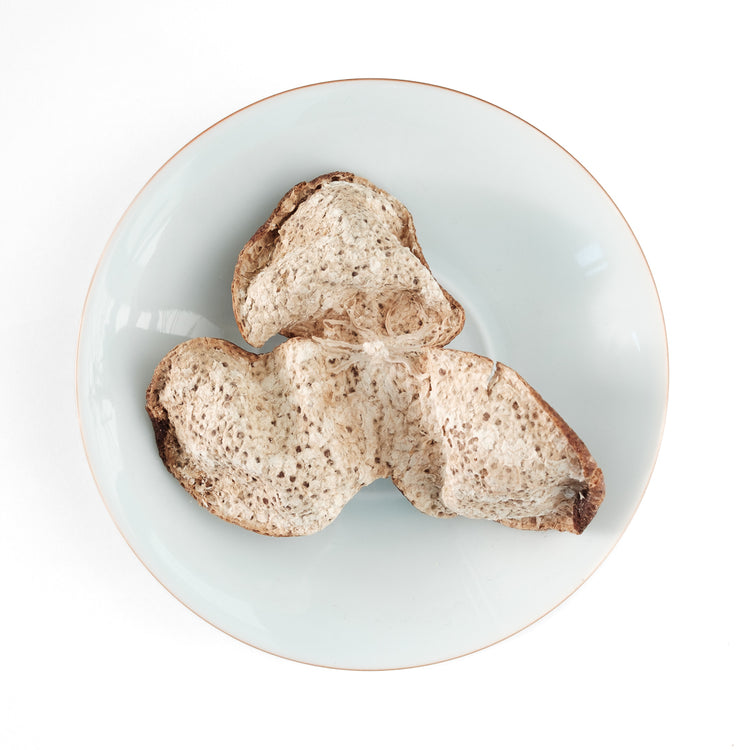
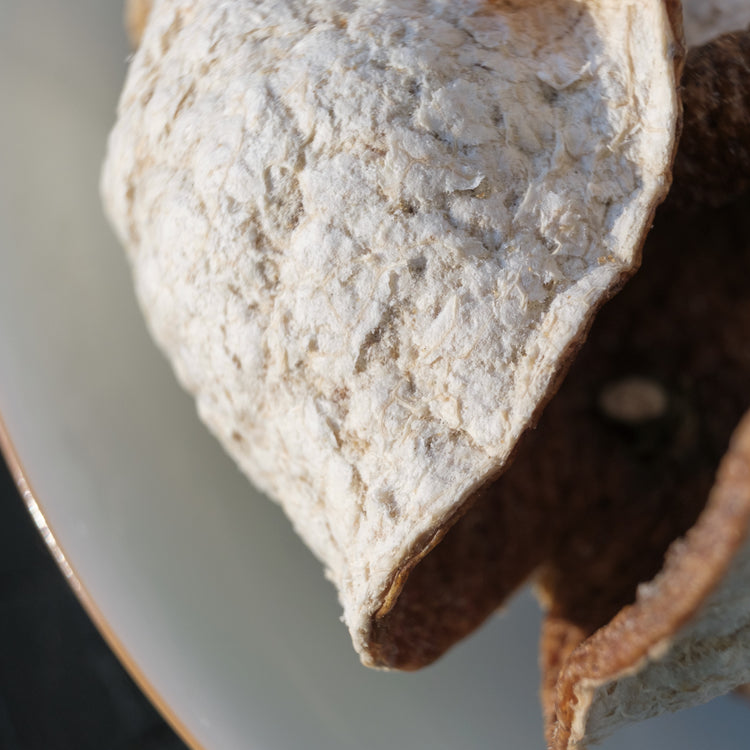


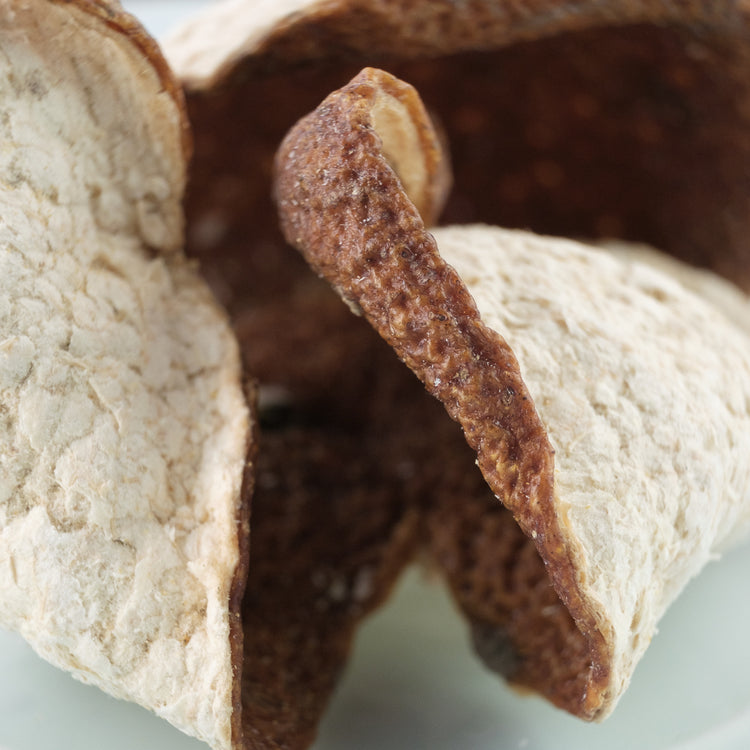

5-Year Aged Chenpi from Xinhui
- Regular price
-
£9.00 - Regular price
-
- Sale price
-
£9.00
wonderful drink at this time of the year (November), when humidity kicks in here in Lisbon – thank you for sharing









